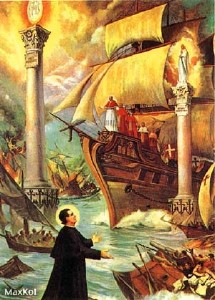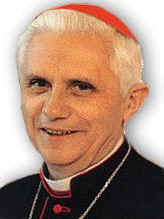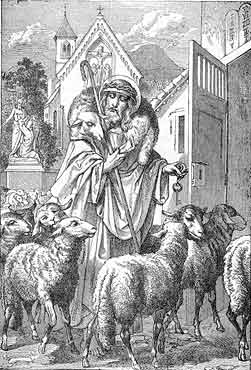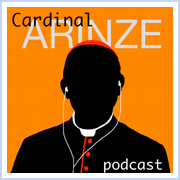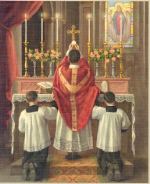The apostle St. Peter was the first head of the Church, appointed by the divine Founder Himself. Our Saviour promised this dignity to St. Peter, and then actually bestowed it upon him. After the ascension of Christ St. Peter acted as the ruler of the Church, and he was recognized and accepted as such by the other apostles.
In continuing the course of our instructions the next question to be considered is, who has been the head of the Church since the death of St. Peter' A little thought on the three following points will give us the answer:
I. It was necessary that the office of chief shepherd should continue to exist after the death of St. Peter.
II. St. Peter went to Rome and there became Bishop of Rome, and was holding this office at the time of his death.
III. The Pope is the head of the Church because he is the legitimate successor of St. Peter to the See of Rome.
IIt was necessary that after the death of St. Peter the Church should still have a supreme head. This we know was the intention of Chris-for He instituted the Church that it might last not only for a few years, or a couple of centuries, but for all time. "Behold I am with you always, even to the consummation of the world" (Matt. xxviii. 20). “The gates of hell shall not prevail against My Church," and "The spirit of truth will abide with you forever." Clearly, Christ meant His Church to endure forever, and we have proved to you beyond doubt that in the beginning He Himself appointed who was to be its head. If a supreme head of the Church was necessary at the beginning, was it not just as necessary later on and at all times of her existence?
Our Saviour likened His Church to a building, and certainly a building can neither be erected nor can it stand firm without foundations. He compared her to a flock, which, whether it be a large flock or a small flock, will not long remain intact without a shepherd. Our Saviour also called His Church a kingdom, and you will agree that a kingdom where there were no regent to rule in the absence of the king would be in grave danger. St. Paul likens the Church to a body, and neither in youth nor in old age can a body exist without a head. The position of the Church in later centuries became, if anything, more complicated and difficult than in the beginning and, therefore, more in need of a ruler and guide.
In the early days of Christianity the Church was more limited; congregations were smaller, consisting perhaps only of a handful of people, and they were closely united, being one heart and one soul, and living really as fellow citizens of the one great kingdom of God. Moreover, the apostles had themselves been learners at the feet of the Saviour but a short time before, and, full of the Spirit of God, were unerring in what they taught. If ever the Church could have dispensed with the authority of a supreme ruler it would have been at this time, and yet one was definitely named and appointed by our Saviour.
His wisdom and providence foresaw the persecutions and divisions that were to follow the greater expansion of the Church, which He knew would grow and increase, spreading over many countries and nations, and embracing many different races of people. He realized that the apostles themselves would pass away in a very few years, while the ranks of the faithful, growing larger and larger, would require a greater number of priests and bishops. He knew, too, that His Church would number more sinners than saints among her children, and that enemies from without and from within would rise up against her.
Could He, in His wisdom and providence, have meant to leave her to face these dangers and difficulties with no supreme head, no ruler and guide to control and direct her? Such a thing is incredible. If our Saviour appointed a supreme head for the days of the apostles, it is beyond question His will that the office of Pope should always exist in His Church.
IIOn whom was to fall St. Peter's mantle after his death, or, in other words, who was to be his. Successor? The following points will make this clearly apparent.
(1) We say that St. Peter went to Rome and remained in Rome. Now is this true? Since the Great Schism it has been fiercely contested, and it is easy to understand that those who do not want to recognize and submit to the Pope of Rome should try to make out that he is not the successor of St. Peter. It is certainly clear that he is not the successor of St. Peter, if St. Peter never went to Rome. A great deal depends, therefore, on our being certain whether or not St. Peter ever did go to the Eternal City, and for this reason the enemies of the Papacy have left no stone unturned to controvert this fact.
But they have not been successful, for it is established beyond doubt that St. Peter not only went to Rome, but that he remained there. A whole host of trustworthy witnesses of ancient times, and from the most different parts of the world, from Italy (Caius), Gallicia, Africa (Tertullian), Greece, Asia (Eusebius), Egypt (Clement), testify to it. It would be traveling too far afield for me to lay before you in detail the evidence of every single one of these writers. To do so I should have to give you their names and the date at which they lived; explaining how much weight was to be attached to what they say and citing their exact words in their full meaning and context. But I will quote one writer for you, whose testimony, in perhaps a more striking way than any other, lends weight to what I am contending; for St. Peter himself has written two epistles, both of which form part of the Canon of Scripture, and at the close of the first one he says: "The Church that is in Babylon, elected together with you, saluteth you." Now where was St. Peter when he wrote this? He tells us himself he was in Babylon: "The Church that is in Babylon, elected together with you, saluteth you" (1 Peter v. 13).
Which Babylon can he mean? Was it Babylon on the river Euphrates in distant Asia, where King Nabuchodonosor and King Balthasar reigned, where Daniel performed his miracles, the city which was finally conquered by Cyrus the Great? No, this is not the Babylon meant, for at the time St. Peter wrote his epistle it had long been a heap of ruins. None of the apostles ever went there; it had had no Christian community. The Babylon to which the apostle alludes is Rome. The early Christians were fond of comparing Rome to the ancient city of Babylon, and of bringing out and accentuating the points of resemblance between them; and there were many. Babylon, which once represented an empire with 120 provinces, had been as Rome was, the most powerful capital of the world in its own day. It had been, like Rome, the center and the bulwark of Paganism, and a perfect swamp of iniquity and vice.
The rulers of Babylon were the great enemies of the religion of the true God under the old dispensation, and the emperors of Rome played the same part to the divine dispensations under the New Law, by the zeal and bitterness with which they persecuted the Christians. You will agree that the name of "the new Babylon" given to Rome can not be considered very far-fetched. In the Apocalypse St. John speaks of the mighty Babylon, which he describes as a city built on seven hills, having dominion over all the kings of the earth, which though at that time prosperous and flourishing would in the end be overthrown and meet its downfall.
Clearly, this 'is the city of Rome, which is actually built on seven hills, and which then held dominion over all the kings of the world. Though it was glorious and appeared unconquerable it was, nevertheless, hurrying to its end. If St. John alluded to Rome simply as "Babylon" it would be natural that St. Peter should do the same. So it is St. Peter's own lips that tell us of his being in Rome: "The Church that is in Babylon. . . saluteth you," means" the Church that is in Rome."
IIISt. Peter not only went to Rome, he died there. I will give you the evidence of but one of the many writers of old from whom we learn this. Eusebius, the Father of Church history, writes: "According to tradition Paul was decapitated in Rome during the reign of Nero, while Peter was crucified, and this tradition is supported by the fact that the holy apostles are buried in Rome and their remains venerated there up to this very day." Tradition vouches for the fact that both the holy apostles suffered martyrdom under Nero, and at the time of this writer it is shown that their remains were venerated actually in their sepulchers. The same author appeals to another writer, who lived and wrote in Rome a hundred years earlier: "I can direct you to the memorials of the apostles. In going to the Vatican or along the Ostian Way you will see the memorials of the founders of this church in front of you.” So, apparently, at the time at which this was written there existed in Rome either at the place where they suffered death, or at the spot where they were interred, memorials to St. Peter and St. Paul; the writer had himself seen them, there is no doubting his word.
Now, would memorials be erected in Rome to people who had never been there, or would the people of Rome be likely to commemorate the death of those who were unconnected with their city? Rome was not an unknown village, but the capital of the world, full of Christians, divines, learned men, and artists of all kinds. It is impossible that a monument commemorating St. Peter's martyrdom could have been erected there, that the place of his burial could have been venerated for centuries, if it were not true that he had died and been buried there. Such a thing is absolutely incredible.
St. Peter was in Rome, and died in Rome, as bishop and guide of the Roman Church. Now, whoever became Bishop of Rome in his place would naturally be his successor and here we have the beginning of the supremacy of the Bishop of Rome over all the other bishops of the world. Their judgment is appealed to, and with them rests all decisions in matters relating to faith; they summon Church councils, presiding themselves on all occasions, and always taking precedence. Here we see the working of divine Providence. Rome was originally the center and capital of the world, the home of many different forms of worship, the sink of immorality and vice; but it was likewise the seat of the most powerful emperor, where all the culture, knowledge, art, and magnificence of Paganism was concentrated. All roads lead to Rome. It seems but fit that the capital of the great Pagan empire should become the center of God's earthly kingdom; that the chair of Peter should be side by side with the throne of the great emperors; that the head of the apostles should exercise his jurisdiction there where all the powers of Paganism were once let loose against him.
Yes, dearly beloved brethren, if we had lived at the time of the apostles, and been present when they divided the world between them for their work of conversion, and if we had been asked where Peter was to go, I think that even with our limited knowledge and outlook we should at once have said: "Peter is the head; Peter must go to the capital; Peter must go to Rome."
The veneration due from us to St. Peter, the head of the apostles, should be extended to his successor the Pope, and to his city, the very name of which should ring in Catholic ears as that of a second home-the holy city of Rome.
Adapted from Popular Sermons on the Catechism
by Fr. Hubert Bamberg, 1914

